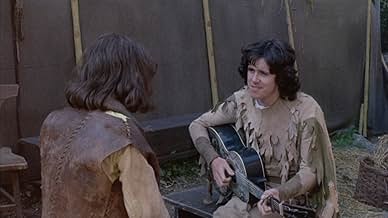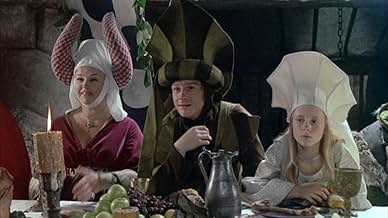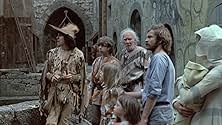VALUTAZIONE IMDb
6,3/10
1007
LA TUA VALUTAZIONE
Aggiungi una trama nella tua linguaIn 1349, while the Black Plague threatens Germany, a troupe of acrobats and musicians arrives in the town of Hamelin a few days before the mayor's daughter's wedding.In 1349, while the Black Plague threatens Germany, a troupe of acrobats and musicians arrives in the town of Hamelin a few days before the mayor's daughter's wedding.In 1349, while the Black Plague threatens Germany, a troupe of acrobats and musicians arrives in the town of Hamelin a few days before the mayor's daughter's wedding.
- Regia
- Sceneggiatura
- Star
Recensioni in evidenza
Grimm Brothers tale of a strolling minstrel in 1349 Germany who agrees to rid the village of Hamelin of plague-carrying rats is given a serious, perhaps overly-solemn treatment. Jacques Demy has directed the story in a straightforward fashion, without any humor or playfulness, mystery or beauty (with the exception of the sunrise-heightened finale). Pop singer Donovan is well-cast in the title role, and his music compositions are good even if his songs are not of the Medieval period. The other cast members--top-billed Jack Wild, Donald Pleasance and John Hurt--have very little to do; Wild, in particular, is forced to painfully hobble around with a crutch as an alchemist's assistant. Michael Hordern as Melius, who is unable to conjure a cure for the Black Death and is arrested for being a heretic, gives the picture's finest performance, though his final moment tied to a stake may prove to be too heavy for the movie's supposed 'family audience.' The dank, mildewy locations, period costumes and bedraggled extras all lend a convincing air to the film, but "Piper"'s downbeat nature (not to mention all those rats!) makes it a tough sell. ** from ****
Watching this recently, I remembered certain scenes from when I watched it as a child of about 7 or 8, some twenty-five years ago. That is testament to how effective some of The Pied Piper is. Indeed, in some ways it hardly qualifies as a "childrens' film" at all, as it starts with a picture of a heretic being burned at the stake and ends with the death of one of the main characters by the same means. Clearly Demy had Bergman's The Seventh Seal in mind for the general feel of the film, which stresses the irrationality and brutality of the times. However, the screenwriters and Demy add another ingredient - the political chicanery of the Church, the aristocracy and the merchant class, sometimes colluding together, at other times each promoting their own special interests. It's not difficult to read the film as a quasi-Marxist parable about feudal society, and the film-makers clearly intended something of the sort. If that makes it all sound very heavy, actually the film is fairly fast-moving and fun, especially because of the wonderfully comic grotesque playing of Donald Pleasance and Roy Kinnear. Fans of these actors should definitely seek this film out - Pleasance is as good as he was in "Death Line" (AKA "Raw Meat") made about the same time, and Kinnear is nearly as good as he was in "Juggernaut", another overlooked but very interesting British film of the early 70s. There is also a very good performance from Michael Hordern as the rationalist alchemist, one of his better and most substantial but unfortunately least known performances. Nostalgia fans can also take pleasure in remembering a time when Jack Wild, made famous by "Oliver", was considered a star. The Pied Piper deserves its mixed critical reputation. Demy does not here have the firm control over his material he had in earlier films. The main flaw is the total lack of characterisation of the Piper, and the terrible non-acting of the folk singer Donovan in that role. His musical interludes are just embarrassing and the worst thing about the film (for a similar ruining of a otherwise thoughtful historical film by a miscast singing star, see 1969's "Where's Jack?" with Tommy Steele). This is a pity as the socio-political stuff at the edges of the film, plus the costumes and scenery, are very good indeed. Overall, this is certainly worth a watch if it turns up on TV or you might, as I did, seek it out on a secondhand VHS cassette. It is not a major film but it's an endearing oddity, and certainly a must-see for Demy students or fans of Brtish film in the early 70s.
Back when I was a (allegedly disturbed) young child, "The Pied Piper of Hamelin" was my absolute favorite fairy-tale. I owned many tapes that were filled with bedtime stories and fairy-tales, but I mostly just listened to "The Pied Piper" because it featured fascinatingly morbid topics like the black plague, child abduction, rat infestations and a mysteriously sinister guy playing the flute. I was always convinced the premise of Robert Browning's eerie poem could form the basis of a series of unimaginably dark horror movies, but unfortunately there aren't that many. This British production, filmed on location in Germany, is a pretty great version but it's incredibly obscure for some reason and I spent an awful long time purchasing a decent copy. Now that I finally own it, I'm both thrilled about re-experiencing the familiar story lines as well as surprised about discovering entirely new story aspects I wasn't even aware of. The new (to me, at least) elements mostly handle about political and religious hypocrisy, so I presume that is the reason why they weren't included in any of the fairy-tale versions I grew up with. But it remains a fascinating story and a fabulously engaging film, only suffering from obvious and regrettable budget restrictions. Director and co-writer Jacques Demy had a clear and personal vision of the story, and it's definitely not a movie for young children to watch. Although never graphic or repulsive, "The Pied Piper" thrives on a disturbing atmosphere and it never evades any controversial themes, like the abuse of political power by the Catholic Church and the arranged marriages with minors. Donovan is excellent as the Piper, passing through Hamelin with a family of traveling circus artists. The burgomaster and the Baron (another splendid role for versatile super-actor Donald Pleasance) supposedly run the secluded little town, but they mainly obey the will of the uncanny red monks that always look over their shoulders. The friendly Jewish alchemist Melius is concerned about a threatening outbreak of the Bubonic plague, the power-hungry son of the Baron (John Hurt) is about to wed the under-aged burgomaster's daughter for financial reasons and the Pied Piper is the only person capable of freeing the town from its rat infestation. The script of this film is well filled and requires your absolute full attention, but the elaboration of the different story lines is highly compelling and the dialogs are enchanting. The costume designs and scenery are terrific and genuinely take you back to the dark and unsettling medieval times. Donovan, primarily a singer, also provides the film with a couple of great songs (most notably "They Call me the Pied Piper" and "Life has its ups and downs") and there are at least two near-brilliant and unforgettable sequences. Namely the rats breaking out of the wedding cake and a harrowing execution scene near the end. If you own "The Pied Piper", it's definitely a film to treasure.
A previous reviewer said that this version is probably closer to the original version of the story than any other version with which we're familiar in this day and age. Given the portrayal of the bubonic plague, I would have to agree. And it only adds to the movie's quality that they cast Donovan as the title character. I should warn you that this movie is rather dark - but never gross - and not even trying to be "cute", so don't expect that. Also starring Jack Wild, John Hurt and Donald Pleasance.
One other thing is that "The Pied Piper" is (as far as I know) not officially available on video or DVD. It is available in the video/DVD store Movie Madness, here in Portland, Oregon. If you're ever in Portland, you should come to Movie Madness.
One other thing is that "The Pied Piper" is (as far as I know) not officially available on video or DVD. It is available in the video/DVD store Movie Madness, here in Portland, Oregon. If you're ever in Portland, you should come to Movie Madness.
Jacques Demy, at his best, was one of those directors who, like Charlie Chaplin, Akira Kurosawa, Jim Jarmusch, or Ernst Lubitsch, could ascend to the ranks of the greats without possessing the immense intellectual and artistic faculties of many of his contemporaries (i.e. Bergman, Tarkovsky, Godard, Pasolini, Antonioni, Buñuel, Bresson, et cetera). Unfortunately, Demy was never as consistent or as prolific as Chaplin or Kurosawa, for instance, who released one good-to-great film after another for such an extensive career. Nevertheless, films like "Lola" and particularly "The Umbrellas of Cherbourg" showed that cinema could be masterful without being artistically ambitious. Like Ozu, Demy proved that a true masterpiece could derive from emotional expressiveness, not only intellectual expressiveness.
In addition to this emotional depth, the other impressive facet of Demy's cinema was, of course, his stylistic abilities. "The Umbrellas of Cherbourg" is truly one of the most stylistically impressive films ever made; visually sumptuous on a level entirely of its own. "The Young Girls of Rochefort" also demonstrates Demy's capacity for stylistically rich and luxurious cinema. We can even see it as early as "Le bel indifférent", his 1957 short film based on a Cocteau play.
Resplendent visuals and extreme emotional potency — these two things Demy did as well as just about anyone to ever sit in a director's chair. "The Pied Piper", therefore, was a bit perplexing to me. It wasn't by any means poorly filmed, but like "The Model Shop", Demy's other previous film made outside of France, it simply lacked his usual flare for lush and lavish visuals. By comparison to his French films, "The Pied Piper" is very mundane, aesthetically speaking.
As for the emotional potency, there is very little. There's not much plot, which in and of itself is absolutely fine by me, but the film seems to lack the emotional punch that we're used to from Demy, although naturally that will vary from person to person, to some degree.
Furthermore, although the film is definitely a fantasy, which is in keeping with Demy's last film, "Donkey Skin", it is really quite gloomy in its mood. Demy, who is usually so filled with life and energy, is quite dreary here. Of course, "The Model Shop", an American film, was also rather dull in tone and lifeless compared to his usual work, so perhaps Demy is a product of his environment. Perhaps his milieu determines the nature of his films. Working in France, his films tend to be filled to the brim with warmth and vibrancy. Outside of France, he seems to be another filmmaker all together.
"The Pied Piper" is also extremely cynical. Demy, who has always been the classic romantic, takes a completely different look at humanity in this film. Instead of his characteristic enthusiasm for life and romantic fervor, "The Pied Piper" is deprived of anything that could be perceived as the kind of life-affirming fun and joyousness that permeated most of his previous films. Truly, he is unrecognizable here.
The film, which is set in Germany in the 1300s, satirizes the Catholic Church and politicians, among other things, and paints a very grim portrait of humanity. It stars Jack Wild, John Hurt, Donald Pleasence, and others, including Donovan, who composed and performed the music for the film. As far as that goes, let's just say he's no Michel Legrand. One of the most ridiculous aspects of the film was the way that '60s/'70s culture so obtrusively pervaded a film that was meant to be set in the 14th century. Throughout the film, Donovan plays music on a style of six-string guitar that I'm almost certain did not exist at the time, and the music he plays sounds so laughably like the '60s/'70s that it became difficult to take anything I was seeing seriously. Generally a period piece makes an effort to disguise the modernity of its production, but not here.
At times this film reminded me of the later work of Roberto Rossellini, such as "Blaise Pascal", "Cartesius", and especially "The Age of the Medici". Needless to say, those were historical films, and Demy's film is a fantasy, but the style and tone of the films are similar in some ways.
While "The Pied Piper" is not truly a musical, Donovan's score and the songs he plays on a few occasions during the film certainly are a large part of defining the overall feel of the film, and he simply can't do for "The Pied Piper" what Legrand was able to do for "The Umbrellas of Cherbourg" or even "The Young Girls of Rochefort". Donovan's music here just isn't very good, and it contributes nothing of any real value to the film.
At the end of the day, this film represents to me the paragon of mediocrity. It is certainly not a bad film, and certainly not a good one. The most interesting parts of the film are the social commentary and satire that Demy delivers with a surprisingly scathing and uncompromising bluntness, but even there, the film doesn't really say anything new or different than what we've seen many times before in cinema: Authority is corrupt and human vice takes root where man attempts to attain or maintain power. Demy exposes religious officials' use of apparent piety and ecclesiastical values as a thinly veiled disguise for greed and immorality. This really isn't anything original or profound in terms of new ideas in cinema, but it's interesting coming from Demy, who I wouldn't have pegged for this kind of cynicism.
I can't say I'd recommend this film, but I don't think it's a real waste of time either. There will inevitably be those with whom the film clicks, but I'm guessing that the majority of experienced filmgoers won't take much away from this one.
RATING: 5.00 out of 10 stars
In addition to this emotional depth, the other impressive facet of Demy's cinema was, of course, his stylistic abilities. "The Umbrellas of Cherbourg" is truly one of the most stylistically impressive films ever made; visually sumptuous on a level entirely of its own. "The Young Girls of Rochefort" also demonstrates Demy's capacity for stylistically rich and luxurious cinema. We can even see it as early as "Le bel indifférent", his 1957 short film based on a Cocteau play.
Resplendent visuals and extreme emotional potency — these two things Demy did as well as just about anyone to ever sit in a director's chair. "The Pied Piper", therefore, was a bit perplexing to me. It wasn't by any means poorly filmed, but like "The Model Shop", Demy's other previous film made outside of France, it simply lacked his usual flare for lush and lavish visuals. By comparison to his French films, "The Pied Piper" is very mundane, aesthetically speaking.
As for the emotional potency, there is very little. There's not much plot, which in and of itself is absolutely fine by me, but the film seems to lack the emotional punch that we're used to from Demy, although naturally that will vary from person to person, to some degree.
Furthermore, although the film is definitely a fantasy, which is in keeping with Demy's last film, "Donkey Skin", it is really quite gloomy in its mood. Demy, who is usually so filled with life and energy, is quite dreary here. Of course, "The Model Shop", an American film, was also rather dull in tone and lifeless compared to his usual work, so perhaps Demy is a product of his environment. Perhaps his milieu determines the nature of his films. Working in France, his films tend to be filled to the brim with warmth and vibrancy. Outside of France, he seems to be another filmmaker all together.
"The Pied Piper" is also extremely cynical. Demy, who has always been the classic romantic, takes a completely different look at humanity in this film. Instead of his characteristic enthusiasm for life and romantic fervor, "The Pied Piper" is deprived of anything that could be perceived as the kind of life-affirming fun and joyousness that permeated most of his previous films. Truly, he is unrecognizable here.
The film, which is set in Germany in the 1300s, satirizes the Catholic Church and politicians, among other things, and paints a very grim portrait of humanity. It stars Jack Wild, John Hurt, Donald Pleasence, and others, including Donovan, who composed and performed the music for the film. As far as that goes, let's just say he's no Michel Legrand. One of the most ridiculous aspects of the film was the way that '60s/'70s culture so obtrusively pervaded a film that was meant to be set in the 14th century. Throughout the film, Donovan plays music on a style of six-string guitar that I'm almost certain did not exist at the time, and the music he plays sounds so laughably like the '60s/'70s that it became difficult to take anything I was seeing seriously. Generally a period piece makes an effort to disguise the modernity of its production, but not here.
At times this film reminded me of the later work of Roberto Rossellini, such as "Blaise Pascal", "Cartesius", and especially "The Age of the Medici". Needless to say, those were historical films, and Demy's film is a fantasy, but the style and tone of the films are similar in some ways.
While "The Pied Piper" is not truly a musical, Donovan's score and the songs he plays on a few occasions during the film certainly are a large part of defining the overall feel of the film, and he simply can't do for "The Pied Piper" what Legrand was able to do for "The Umbrellas of Cherbourg" or even "The Young Girls of Rochefort". Donovan's music here just isn't very good, and it contributes nothing of any real value to the film.
At the end of the day, this film represents to me the paragon of mediocrity. It is certainly not a bad film, and certainly not a good one. The most interesting parts of the film are the social commentary and satire that Demy delivers with a surprisingly scathing and uncompromising bluntness, but even there, the film doesn't really say anything new or different than what we've seen many times before in cinema: Authority is corrupt and human vice takes root where man attempts to attain or maintain power. Demy exposes religious officials' use of apparent piety and ecclesiastical values as a thinly veiled disguise for greed and immorality. This really isn't anything original or profound in terms of new ideas in cinema, but it's interesting coming from Demy, who I wouldn't have pegged for this kind of cynicism.
I can't say I'd recommend this film, but I don't think it's a real waste of time either. There will inevitably be those with whom the film clicks, but I'm guessing that the majority of experienced filmgoers won't take much away from this one.
RATING: 5.00 out of 10 stars
Lo sapevi?
- QuizThe film was considered too dark for a children's film.
- ConnessioniFeatured in Garage Demi (1991)
I più visti
Accedi per valutare e creare un elenco di titoli salvati per ottenere consigli personalizzati
- How long is The Pied Piper?Powered by Alexa
Dettagli
- Data di uscita
- Paesi di origine
- Sito ufficiale
- Lingue
- Celebre anche come
- The Pied Piper
- Luoghi delle riprese
- Aziende produttrici
- Vedi altri crediti dell’azienda su IMDbPro
Contribuisci a questa pagina
Suggerisci una modifica o aggiungi i contenuti mancanti

Divario superiore
By what name was Il pifferaio di Hamelin (1972) officially released in India in English?
Rispondi




























